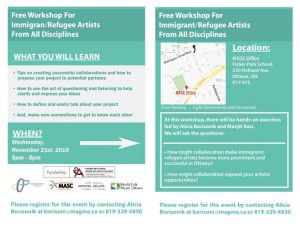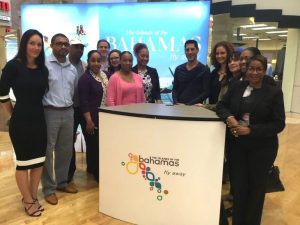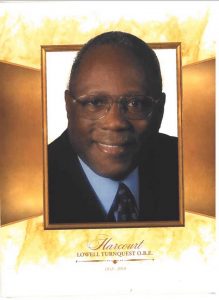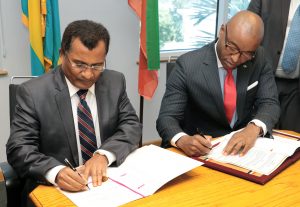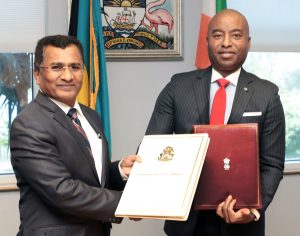Author Archives: consular assistant
Statement Refuting Involvement of President of University of The Bahamas in Fyre Festival
United States Government Shutdown
The Ministry of Foreign Affairs wishes to inform the Bahamian Public that The United States Federal Government shutdown, now in its 27th day,
has not affected relations between our countries.
The Ministry is assured by U.S. Government Officials that Bahamian citizens are still able to access consular services,
such as the acquisition of visas and that critical areas of mutual interest, inclusive of maritime border security arrangements between the two countries,
such as the Comprehensive Maritime Agreement and Operation Bahamas Turks and Caicos are not impacted.
The Governments of the Commonwealth of The Bahamas and United States of America remain strong strategic allies
and are committed to their long-term partnership in areas of mutual interests.
Ministry of Foreign Affairs
Nassau, Bahamas
17th January, 2019
Harcourt Lowell Turnquest O.B.E. 1943-2018
VISIT OF OFFICIAL FROM ACADIA UNIVERSITY
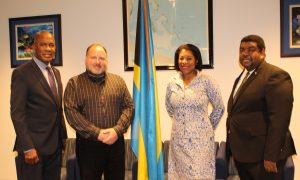
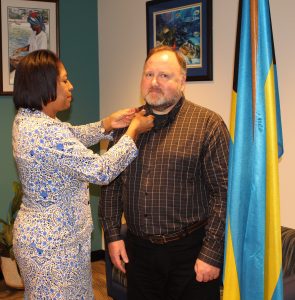
On Wednesday, 5th December, 2018, Mr. Ian Murray, Executive Director of Alumni Affairs of Acadia University located in Wolfville, Nova Scotia, Canada paid a visit to H.E. Alvin A. Smith, Bahamas High Commissioner at the Bahamas High Commission in Ottawa. Included also in the photo are Ms. Chanelle Brown, Counsellor/Consul and Mr. Nestor Sands, Second Secretary/Vice Consul.
SIGNING OF VISA WAIVER AGREEMENT FOR HOLDERS OF BAHAMIAN AND INDIAN DIPLOMATIC AND OFFICIAL PASSPORTS
WTO ACCESSION SUPPLEMENT
2 THE BAHAMAS WTO ACCESSION MESSAGE
OUR MISSION:
A HIGHER QUALITY OF LIFE
Every Bahamian wants a higher quality of life. We want to enjoy good health, proper shelter, sound education, steady
jobs with good pay, profitable businesses and wholesome communities. We want good governance, national development
and pride of achievement. In short, we want peace, prosperity and progress. These things are not possible in a
modern world without a robust economy, and a robust economy is not possible without domestic and global trade.
WHAT IS TRADE?
To enjoy a life of quality, we have to trade. Trade is buying and selling. Through buying and selling, we get the
things we need and desire, such as food, drinks, clothing, shelter, education, healthcare, recreation, government services,
etc. This buying and selling, when it occurs in a rule-governed, equitable context, helps all to live a better life. For
example, a mother buys her baby’s diapers with money she earned selling her labour to her employer; her employer
buys her labour using money he earns selling his products to his customers; and his customers buy from him
using money earned by selling their labour, land or some other asset. Everything turns on trade. The economy
is created, sustained and grown through trade – the buying and selling of products and services.
PRODUCTS VS SERVICES
To live a quality life, we buy and sell “products” and “services”. A product is a tangible thing we buy that produces
benefits such as food, clothing, a television or medicine. A service is an intangible activity we buy that also gives us
a benefit. Such services include a haircut, medical examination, or legal advice. We can take a product with us when
we buy it, but a service is usually only used at the time it is given.
Trade in products is known as “merchandise trade”, while trade in services is known as “service trade”. All
the products and services we buy and sell bring us benefits, and these benefits enhance the quality of our lives. The
more products and services we sell, the more money we earn, the more wealth we build, the more things we can buy
and increase our standard of living. The fewer products and services we sell, the less we earn, the less wealth we build,
the less we can buy, causing our standard of living to decrease. We can only buy more and more goods and services,
if we are able to earn more money selling more and more goods and services. Trade brings wealth and wealth
brings trade.
DOMESTIC VS FOREIGN TRADE
Some of the products and services we buy and sell are produced right at home and bought and sold right at home.
These include fish, conch, lobster, construction, insurance, and the like. When this local buying and selling happens,
we call it “domestic trade”. Many products and services we buy—such as cars, cell phones, refrigerators, and some
medical care—are produced abroad. When we buy these products and services from abroad, it is called international
or foreign trade. When we sell products or services to others outside our country, including lobsters, conch,
straw work, hotel stays, trusts, etc., this is called “international” or “foreign” trade. Actually, the dollars we earn from
selling products and services to others enable us to afford to buy products and services from them. For example, we earn
enough US dollars from tourism, financial services and foreign investment to afford to buy billions of dollars of good and
services from the USA and other countries around the world. In fact, it is our ability to earn foreign currency that keeps
our dollar’s value equal to the US dollar’s value. Trade, in particular international trade, gives us strong
purchasing power.BAHAMASTRADEINFO.GOV.BS
Visa Waiver for Indian Nationals Holding Canadian, UK, US and Schengen Visas
Indian Nationals who hold the Canadian, UK, US and Schengen Visas will not require visas to enter The Bahamas.
All other Indian Nationals will require visas.
Auditor General’s Visit
Auditor General of The Bahamas , Terrance Bastian, and fellow auditors, visited The Bahamas High Commission to audit its accounts.
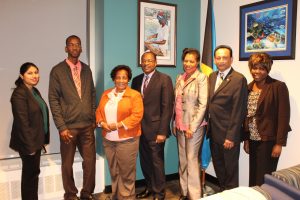
Free Workshop for Bahamians living in Canada
Ms. Alicia Borisonik , Executive Director of World Folk Music Ottawa and cultural consultant for CPAMO (Cultural Pluralism in the Arts Movement Ontario,
Will be holding a FREE workshop to help artists to network, collaborate and learn how to develop an artistic career in Canada.
see link : www.worldfolkmusicottawa.com
https://cpamo.org
To register for this event contact Alicia Borisonik @[email protected] or 819-329-4850
